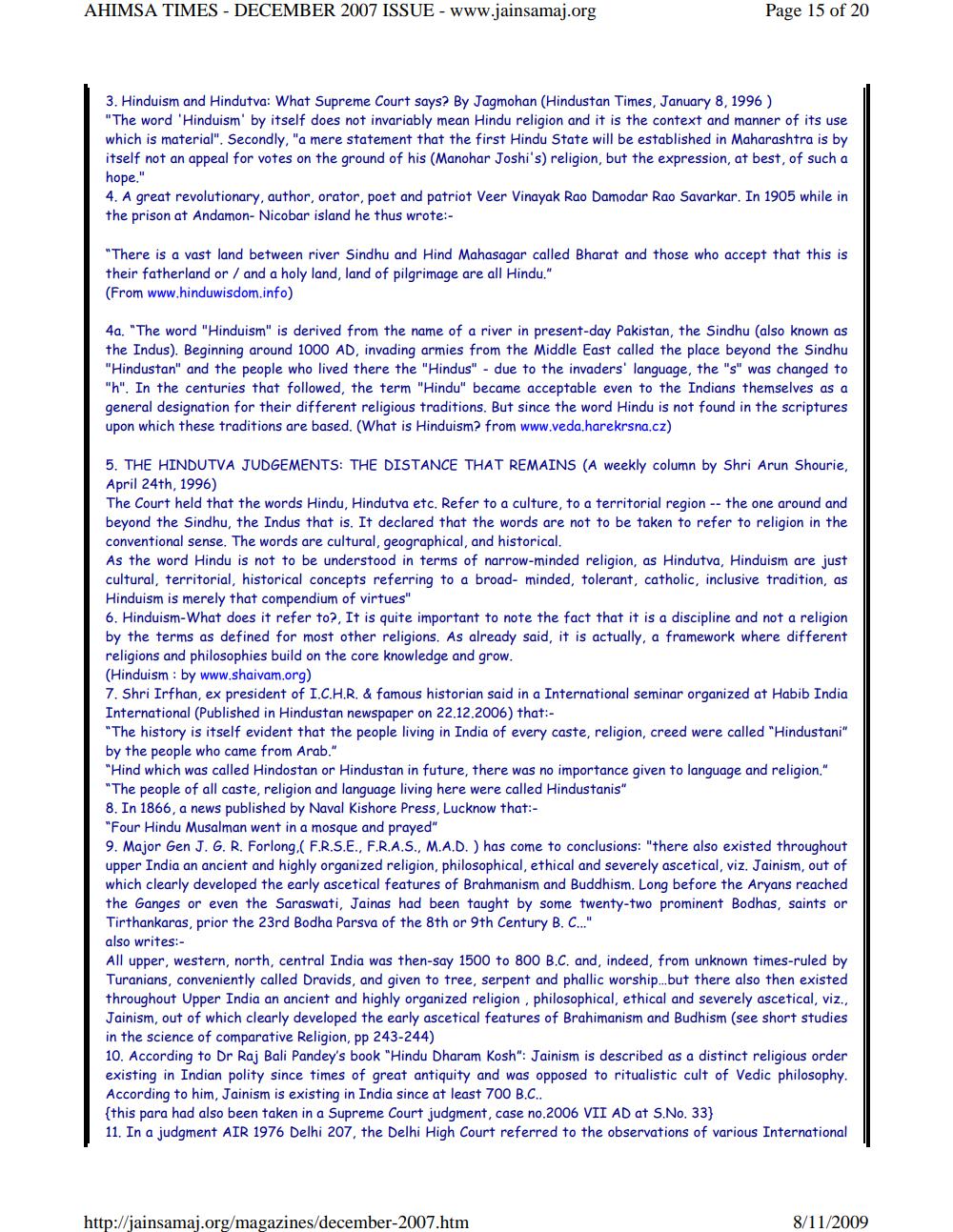________________
AHIMSA TIMES - DECEMBER 2007 ISSUE - www.jainsamaj.org
Page 15 of 20
3. Hinduism and Hindutva: What Supreme Court says? By Jagmohan (Hindustan Times, January 8, 1996 ) "The word 'Hinduism' by itself does not invariably mean Hindu religion and it is the context and manner of its use which is material". Secondly, "a mere statement that the first Hindu State will be established in Maharashtra is by itself not an appeal for votes on the ground of his (Manohar Joshi's) religion, but the expression, at best, of such a hope." 4. A great revolutionary, author, orator, poet and patriot Veer Vinayak Rao Damodar Rao Savarkar. In 1905 while in the prison at Andamon- Nicobar island he thus wrote:
"There is a vast land between river Sindhu and Hind Mahasagar called Bharat and those who accept that this is their fatherland or / and a holy land, land of pilgrimage are all Hindu." (From www.hinduwisdom.info)
4a. "The word "Hinduism" is derived from the name of a river in present-day Pakistan, the Sindhu (also known as the Indus). Beginning around 1000 AD, invading armies from the Middle East called the place beyond the Sindhu "Hindustan" and the people who lived there the "Hindus" - due to the invaders' language, the "s" was changed to "h". In the centuries that followed, the term "Hindu" became acceptable even to the Indians themselves as a general designation for their different religious traditions. But since the word Hindu is not found in the scriptures upon which these traditions are based. (What is Hinduism? from www.veda, harekrsna.cz)
5. THE HINDUTVA JUDGEMENTS: THE DISTANCE THAT REMAINS (A weekly column by Shri Arun Shourie, April 24th, 1996) The Court held that the words Hindu, Hindutva etc. Refer to a culture, to a territorial region -- the one around and beyond the Sindhu, the Indus that is. It declared that the words are not to be taken to refer to religion in the conventional sense. The words are cultural, geographical, and historical. As the word Hindu is not to be understood in terms of narrow-minded religion, as Hindutva, Hinduism are just cultural, territorial, historical concepts referring to a broad-minded, tolerant, catholic, inclusive tradition, as Hinduism is merely that compendium of virtues" 6. Hinduism-What does it refer to?, It is quite important to note the fact that it is a discipline and not a religion by the terms as defined for most other religions. As already said, it is actually, a framework where different religions and philosophies build on the core knowledge and grow. (Hinduism : by www.shaivam.org) 7. Shri Irfhan, ex president of I.C.H.R. & famous historian said in a International seminar organized at Habib India International (Published in Hindustan newspaper on 22.12.2006) that:"The history is itself evident that the people living in India of every caste, religion, creed were called "Hindustani" by the people who came from Arab." "Hind which was called Hindostan or Hindustan in future, there was no importance given to language and religion." "The people of all caste, religion and language living here were called Hindustanis" 8. In 1866, a news published by Naval Kishore Press, Lucknow that:"Four Hindu Musalman went in a mosque and prayed" 9. Major Gen J. G. R. Forlong,( F.R.S.E., F.R.A.S., M.A.D.) has come to conclusions: "there also existed throughout upper India an ancient and highly organized religion, philosophical, ethical and severely ascetical, viz. Jainism, out of which clearly developed the early ascetical features of Brahmanism and Buddhism. Long before the Aryans reached the Ganges or even the Saraswati, Jainas had been taught by some twenty-two prominent Bodhas, saints or Tirthankaras, prior the 23rd Bodha Parsva of the 8th or 9th Century B. C..." also writes:All upper, western, north, central India was then-say 1500 to 800 B.C. and, indeed, from unknown times-ruled by Turanians, conveniently called Dravids, and given to tree, serpent and phallic worship...but there also then existed throughout Upper India an ancient and highly organized religion, philosophical, ethical and severely ascetical, viz., Jainism, out of which clearly developed the early ascetical features of Brahimanism and Budhism (see short studies in the science of comparative Religion, pp 243-244) 10. According to Dr Raj Bali Pandey's book "Hindu Dharam Kosh": Jainism is described as a distinct religious order existing in Indian polity since times of great antiquity and was opposed to ritualistic cult of Vedic philosophy. According to him, Jainism is existing in India since at least 700 B.C.. {this para had also been taken in a Supreme Court judgment, case no. 2006 VII AD at S.No. 33) 11. In a judgment AIR 1976 Delhi 207, the Delhi High Court referred to the observations of various International
http://jainsamaj.org/magazines/december-2007.htm
8/11/2009




